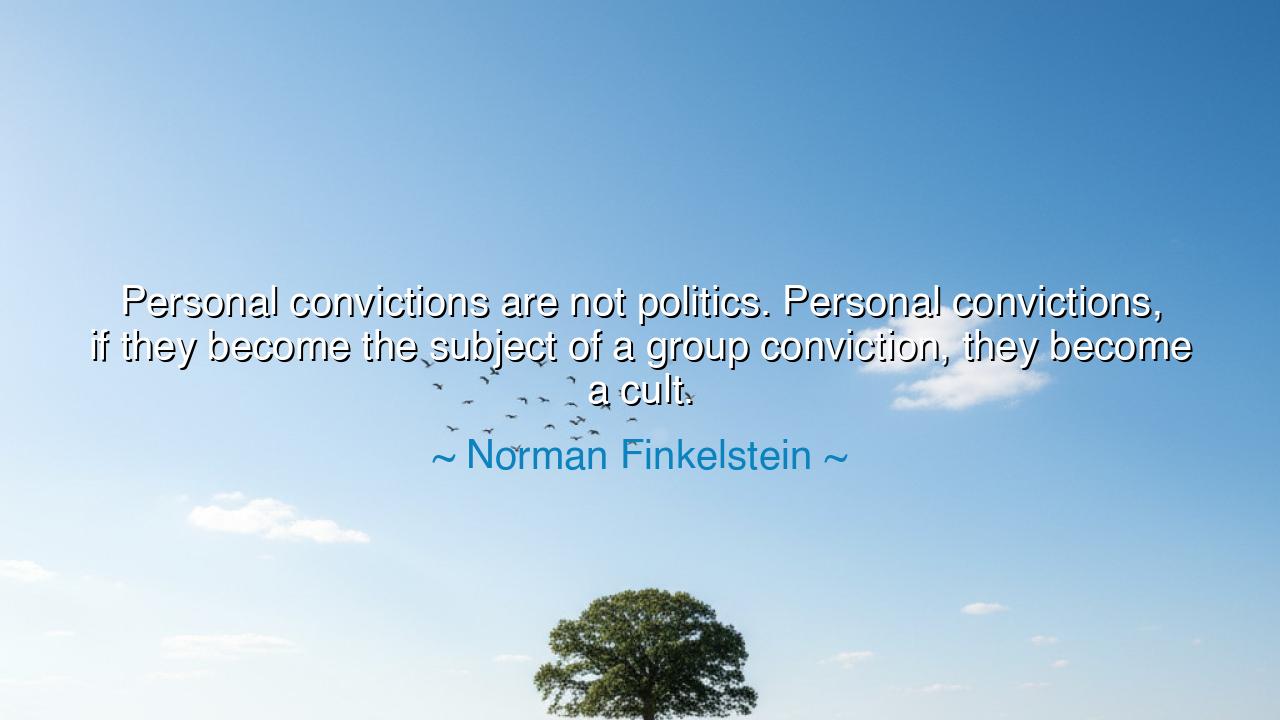
Personal convictions are not politics. Personal convictions, if
Personal convictions are not politics. Personal convictions, if they become the subject of a group conviction, they become a cult.






Hear, O seekers of truth, the words of Norman Finkelstein, who declared: “Personal convictions are not politics. Personal convictions, if they become the subject of a group conviction, they become a cult.” In this utterance lies a warning about the fragile line between belief and governance, between private conscience and collective obsession. For while conviction is noble when borne by the individual, it becomes perilous when elevated into unquestioned doctrine for the many.
For personal convictions are the sparks of the soul—beliefs born from conscience, experience, and inner fire. They give strength to the individual, guiding their choices through life’s trials. Yet when these convictions are imposed upon the multitude as if they were eternal law, they cease to be freedom and become cult. What was once a guiding light becomes a consuming flame, blinding all who gather too close.
History reveals this danger with clarity. Consider the French Revolution, born of noble convictions—liberty, equality, fraternity. But when these ideals hardened into unquestioned dogma, they gave rise to the Reign of Terror, where dissenters were silenced and thousands were executed in the name of purity. Thus, personal conviction, when made absolute for the collective, became tyranny disguised as righteousness.
So too in religion and ideology, where leaders have often taken private visions and transformed them into movements that demanded total obedience. What began as inspiration soon turned to cult, where questioning was forbidden and power replaced truth. Here Finkelstein’s warning burns bright: to confuse conviction with politics is to risk shackling the people to a single mind’s vision, robbing them of freedom.
Therefore, let this wisdom endure: politics must be the realm of reason, debate, and shared responsibility, while personal conviction must remain a matter of conscience. When the two are blurred, freedom withers, and cults rise in place of communities. Finkelstein’s words remind us that to preserve democracy, we must guard against the temptation to make one person’s truth into a universal command. For the strength of a people lies not in uniformity of belief, but in the balance of many voices held together by justice.






M7Cam Muoi 7A
This quote by Norman Finkelstein brings attention to how personal beliefs, when amplified by a group, can lead to dangerous ideological extremes. Does this mean that all political movements with a strong central belief are problematic, or can collective action still be meaningful without becoming authoritarian? How do we maintain healthy debate and open-mindedness in group politics without falling into the trap of cult-like thinking?
MPMy Pham
Finkelstein’s distinction between personal convictions and politics brings up a valid point about the danger of ideology becoming too fixed. But is it really the group aspect that leads to a cult, or is it the intensity and exclusivity of the belief system that creates that dynamic? Can large political movements be powerful without becoming restrictive, and how can we ensure diversity of thought within them?
UGUser Google
I agree with Norman Finkelstein that personal convictions should remain personal to avoid the risk of forming a cult-like mentality. However, many political ideologies start as personal convictions before they are adopted by groups. How can we encourage people to stay open-minded in collective movements, ensuring that the goal remains positive change rather than blind devotion to a single ideology? What safeguards are needed to avoid turning convictions into cults?
NDDang Ngoc Diep
Finkelstein’s comment suggests that when personal convictions turn into group convictions, they lose their freedom and flexibility, becoming rigid and controlling. But isn’t politics built around strong collective beliefs, and doesn’t that make the line between a political movement and a cult a bit blurry? At what point does a movement, no matter how well-intentioned, cross the line into something more coercive or authoritarian?
NKNhi Kieu
Norman Finkelstein’s quote raises an interesting distinction between personal beliefs and group ideologies. When personal convictions become the driving force of a collective, they can easily morph into something more rigid, like a cult. But does that mean any strong group conviction is inherently dangerous? Can collective passion and shared beliefs ever be beneficial without risking the development of dogmatic, cult-like behavior? Where should the line be drawn?